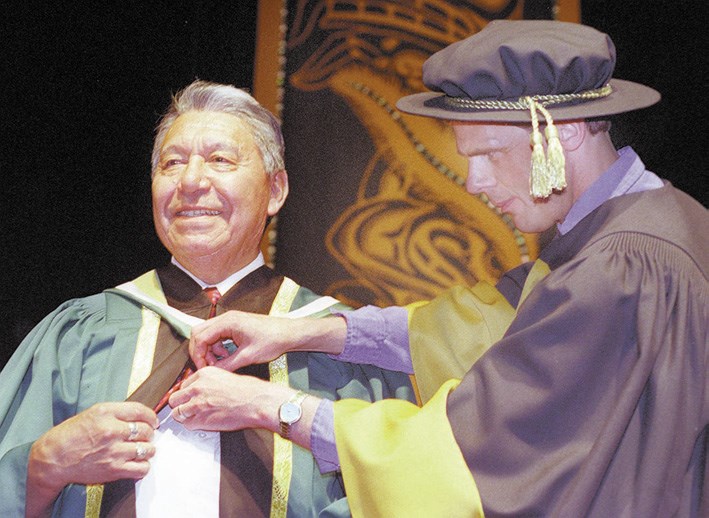Joe Gosnell, a renowned treaty negotiator, politician and leader of the Nisga'a Nation, has died at the age of 85. The Nisga'a Lisims government said Tuesday that Gosnell died in his home in New Aiyansh after a long battle with cancer.
Gosnell was a hereditary Nisga'a chieftain of the Eagle Clan and was president of the nation when it finalized a landmark treaty in 2000 that gave the First Nation control over its land including forestry and fishing rights. It was the first modern-day treaty signed in B.C. since the 1800s.
Nisga'a Nation president Eva Clayton said Gosnell's wisdom, dignity and determination helped lead the First Nation into self-government over its territory northeast of Prince Rupert. "Today, we have lost a giant," Clayton said in a statement.
"His legacy will help shape the project of reconciliation for generations to come."
Gosnell was a recipient of the Order of Canada, the Order of B.C. and held an honorary doctorate of laws from Royal Roads University in Victoria.
In 2019, he was named Chancellor for the University of Northern British Columbia, a position he held until his death.
Flags on the university's campus were lowered to half mast in memory of Gosnell.
“The world has lost a tremendous leader, a man who repeatedly demonstrated a love for his community, his people, education and a commitment to enhancing the lives of others,” said UNBC Interim President and Vice-Chancellor, Dr. Geoffrey Payne.
“His dedication to education was evident during his time as Chancellor. He brought dignity and respect to all proceedings, and spoke thoughtfully, inspiring our graduates at convocation. He will be dearly missed.”
He is survived by his wife of 64 years, Audrey, their seven children and numerous grandchildren and great-grandchildren.
Clayton said Gosnell's work to negotiate the Nisga'a Treaty produced a "beacon of hope" for people around the world.
"His focus was always on what the Nisga'a, British Columbians and Canadians can achieve together," she said.
When a bill to accept the treaty was introduced in the legislature in December 1998, Gosnell told the house the agreement proved to the world that reasonable people can sit down and settle historical wrongs.
"It's a triumph because under the treaty, we will no longer be wards of the state, no longer beggars in our own land. It's a triumph because under the treaty, we will collectively own approximately 2,000 square kilometres of land, far exceeding the postage-stamp reserve set aside for us by colonial governments." He said the treaty proved that negotiations — not lawsuits, blockades or violence — are the most effective and honourable way to resolve Aboriginal issues.
"It's a triumph, I believe, that signals the end of the Indian Act, the end of more than a century of humiliation, degradation and despair for the Nisga'a Nation."
The nation said funeral arrangements will be announced by the family.
- with files from Prince George Citizen



